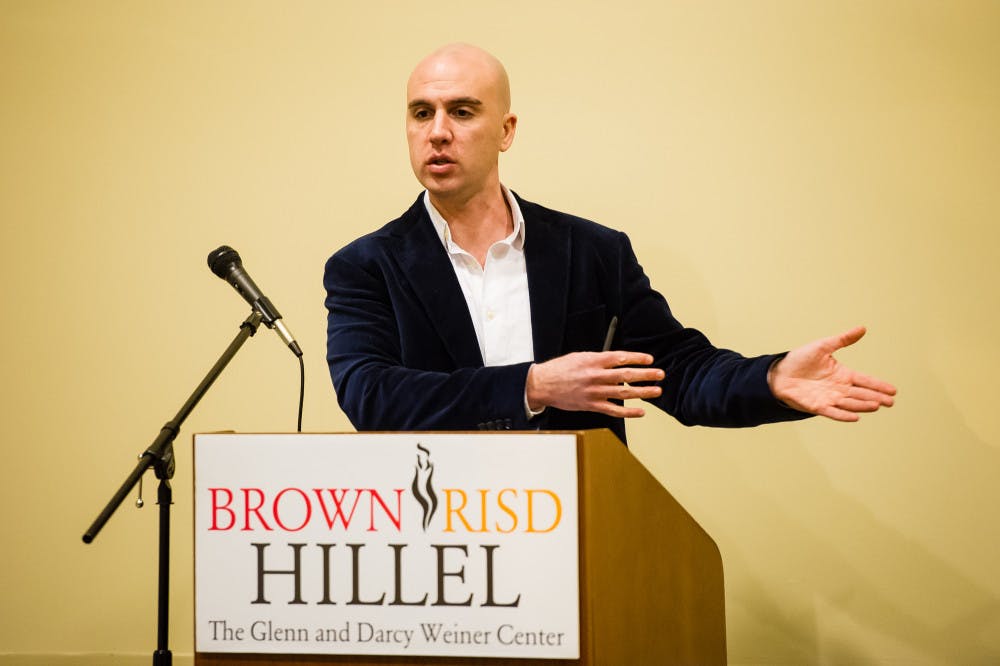As Sgt. Benjamin Anthony of the Israel Defense Forces prepared to speak to an audience of around 40 invited students at Brown/RISD Hillel Wednesday night, about 70 students outside protested both his presence on campus and the Israeli occupation of the West Bank and Gaza Strip.
The protesters organized in the days prior to the event, meeting with administrators and Hillel representatives Tuesday to discuss their concerns.
“I am protesting his presence on campus because of the propagandistic nature of his speech,” said Josette Souza ’14, an organizer of the protest, adding that Hillel’s invitation of “student leaders” is not meant to stimulate dialogue, but rather to influence those who will go on to make domestic and international policy. “That is insidious,” she said.
Hillel purposefully did not advertise the event, hoping to encourage an “intimate” discussion of important issues, said Marshall Einhorn, executive director of Hillel.
Hillel invited student leaders “from the libertarians to the socialists, the (American Civil Liberties Union), Amnesty International and in between,” said Ross Lerner ’14, who helped invite students to the event.
Some students who were invited to attend the lecture chose to protest it instead.
Protesters objected to the event’s private nature and potential lack of a question-and-answer session. “I’m appalled this is happening,” said Reva Dhingra ’14, who was invited to the event. She added that she questioned whether the “insular nature of the event” would limit its effectiveness in starting a dialogue about the Israeli-Palestinian conflict on campus, which Hillel leaders stated as their goal.
“I know from first-hand experience that many of the means that Israel has of defending herself are a consequence of a very solid relationship that has been built across generations between the United States of America and the state of Israel,” Anthony said in an interview with The Herald after his talk. “I’m very alarmed that that’s changing on university campuses.”
Despite concerns that Anthony would not take questions from attendees, he answered audience questions for over an hour immediately following his talk, doubling his budgeted time. Audience members pressed him on whether he supports a two-state solution to the Israeli-Palestinian conflict and whether he thinks of himself as an “occupier” while on duty in the West Bank.
Anthony said he opposed a two-state solution on the grounds that it is currently unrealistic. It is impossible to link the West Bank and the Gaza Strip without compromising Israeli security, he said. Anthony added that he would support an Israeli annexation of the occupied territories — including the extension of voting and citizenship rights to Palestinians there — since doing so would not jeopardize the Jewish majority in Israel as many claim.
Anthony also addressed the issue of Israeli use of white phosphorous gas, a military tactic called out by the protesters as an example of the IDF’s willingness to violate international law. He said he supported both past and future use of the gas, citing his own experience using the gas on the front lines, adding that the gas is not illegal under international law, and Israel is not the only country using it.
Before the lecture, student protesters marched in a circle outside Hillel, chanting with signs, reading a solidarity statement and waving Palestinian flags. After being barred from using sound-amplifying technologies by the Providence police due to city ordinance, protesters moved across the street to the elevated patio outside J. Walter Wilson, where they read poems and named their reasons for protesting.
“I see it as justifying the continued human rights abuses of the IDF in Israel and Palestine,” said Kenneth Lusk ’16.
Some protesters cited personal experiences with the IDF. “As a Palestinian who actually experienced physical harm from IDF soldiers before, I am protesting because this person is representing a system of oppression,” said Ma’an Odeh ’16.
Anthony said he speaks to “humanize soldiers” and probe conversations to delve deeper than “the confines of a headline.”
“Anything in which I’m engaged militarily is done as a consequence of a deep, deep love for my own people and has nothing to do with negative feelings or emotions to another people,” Anthony told The Herald. “If we are not for ourselves, nobody will be,” he said of the Israeli people.
Anthony told The Herald he speaks to university students because of their potential to become world leaders. It is a “great privilege” to be able to speak with them, he said. Anthony has spoken at over 300 college campuses, including all eight Ivy league schools, with his organization Our Soldiers Speak.
He told The Herald he welcomes protesters and does not consider himself “politically aligned” despite coming under fire for his politics.
A previous version of a photo caption accompanying this article mischaracterized the event. Sgt. Benjamin Anthony spoke about his involvement with Israeli forces occupying the West Bank during a question-and-answer period, not in a preceding lecture. The article also originally failed to note that Anthony voiced support for the annexation of the occupied territories only if accompanied by the extension of rights to those living there.

ADVERTISEMENT




